The Itiwit Touring kayak from Decathlon has become a classic among inflatable kayaks for beginners (in Australia the product name is Itiwit Cruising). The kayak is available as a 1-, 2- or 3-seater. We have tested the 2-seater. We paddled it both in pairs and alone on a lake and river. In this test report, we would like to introduce you to the boat and report on our experiences on the water.
Decathlon has recently introduced a new inflatable kayak series, the x100+. It’s available as a 2 and 3 persons kayak and comes with a drop-stitch floor, which promises again more stability and better performance on the water. In addition to that, it has thicker boat skin and doesn’t need the polyester cover anymore. We have paddled and reviewed the Itiwit X100+ as well.
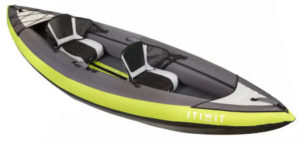
Technical Specs
Max. paddlers:
Length:
Width:
Capacity:
Packed size:
2
340 cm | 11’1”
103 cm | 3’3”
159 kg | 200.4 lbs
67 x 40 x 30 cm |
2’2” x 1’3” x 1′
Material:
PVC Tarpaulin (bottom),
PVC (chambers), Polyester (cover)
Weight:
Pressure:
Produced in:
14 kg | 30.9 lbs
0.1 bar | 1,5 PSI
China
Which model has been reviewed?
Itiwit Touring 2-Seater from 2020
How did we organize the review?
We have purchased the Itiwit Touring ourselves.
How intensively has the product been tested?
low
2 bars = min. 1 day/ 2 half-day tours
3 bars = min. 4 tours
4 bars = min. 8 tours
5 bars = min. 12 tours (very intense)
Where have we tested the product?
Whitewater
Calm rivers
Lakes
First impressions and assembly
The kayak comes with a large backpack. Double paddle and life jackets must be purchased separately. The backpack is good for short transport to the water. For longer trips, the shoulder straps are too thin and not padded, so it quickly becomes uncomfortable. Nevertheless, the transport backpack makes a robust impression and can be opened wide with the surrounding zipper. In addition, even a pump for inflatable kayaks can be attached to the outside of the side.
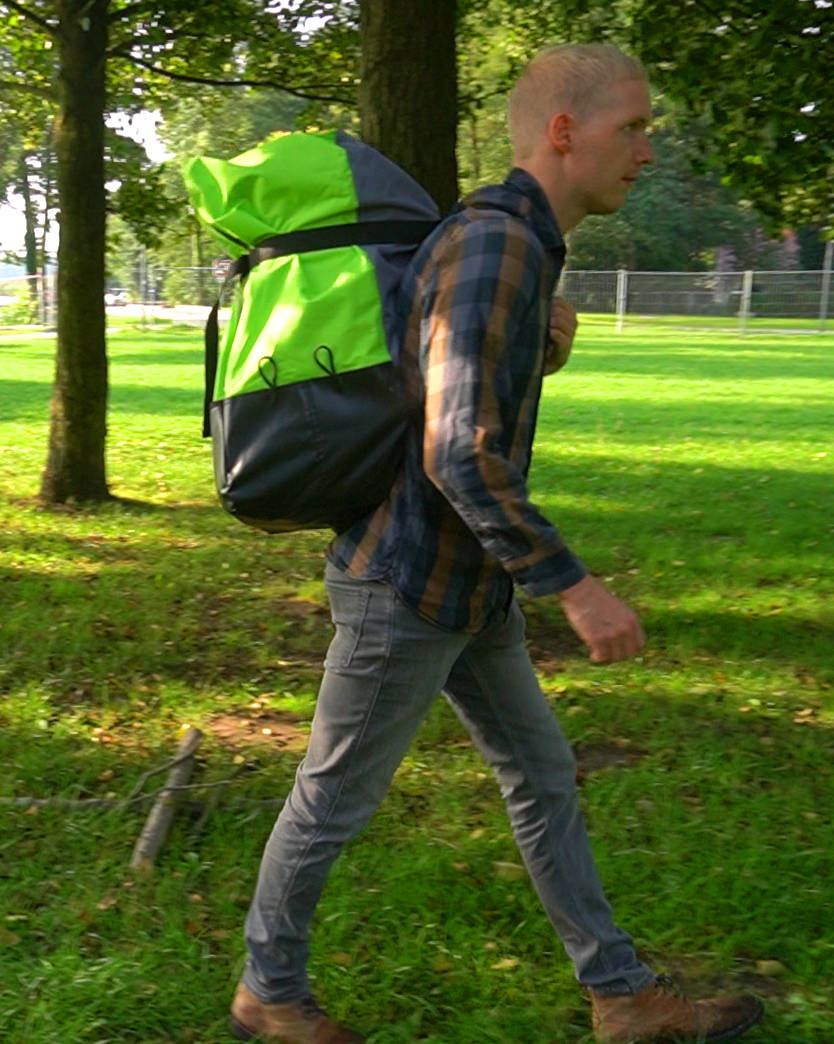
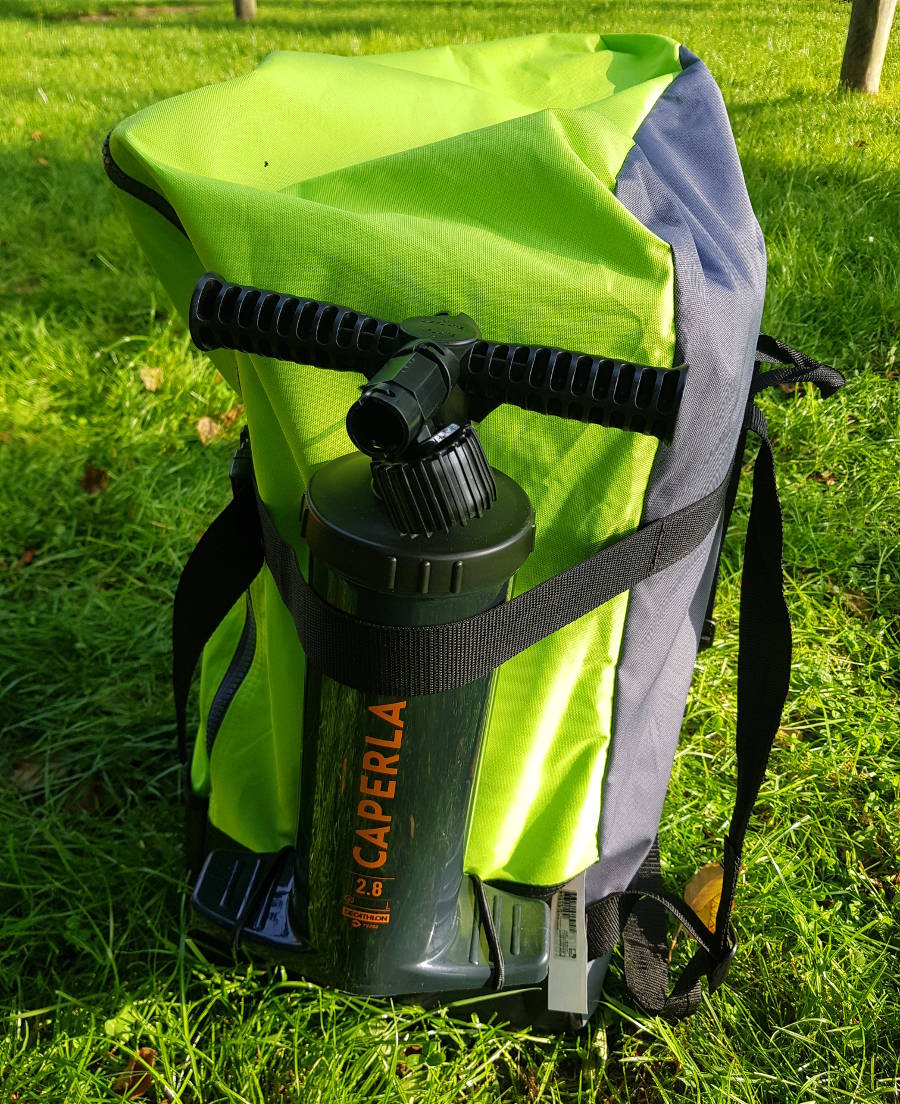
The kayak consists of three separate PVC air chambers, which are located in a polyester cover. The air chambers each have a Boston valve, which is very common in inexpensive inflatable boats (e.g. Sevylor, Intex, Bestway, …). A Boston valve is a 2-way screw valve that keeps the air in the chamber. When you remove the pump tube after inflation, it prevents the air from flowing out of the chamber.
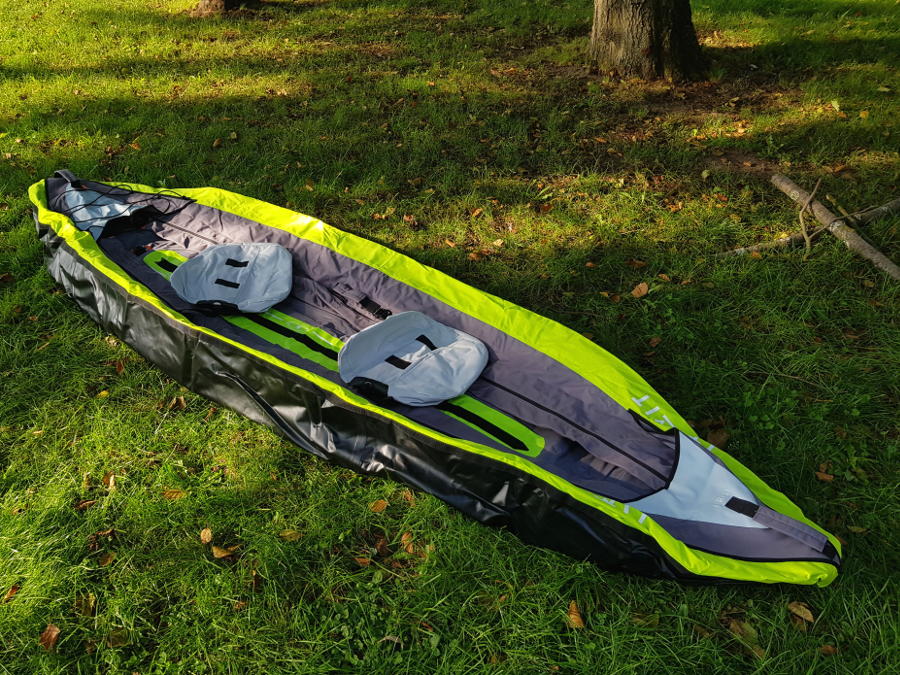
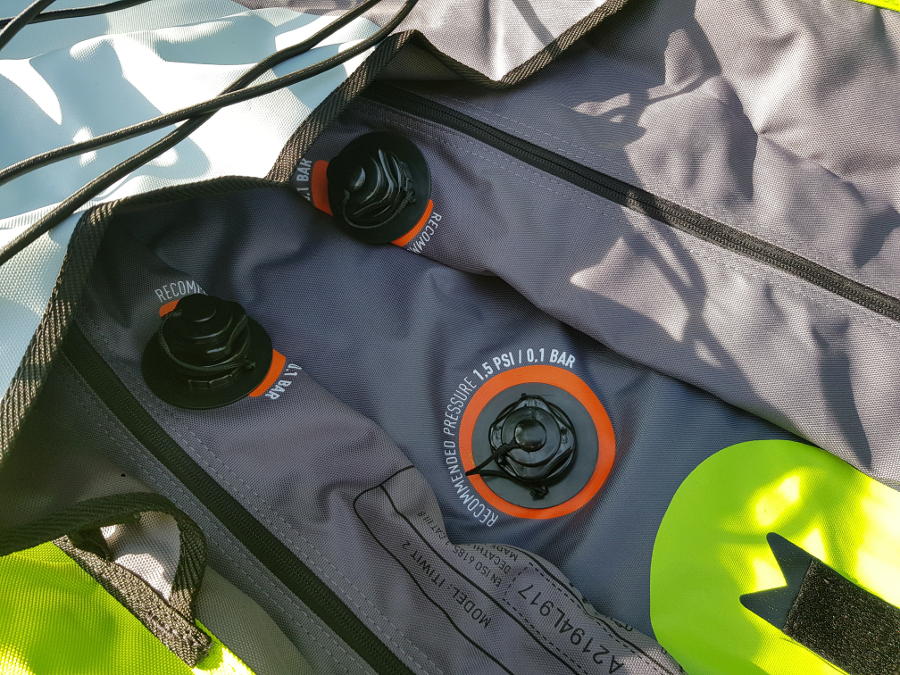
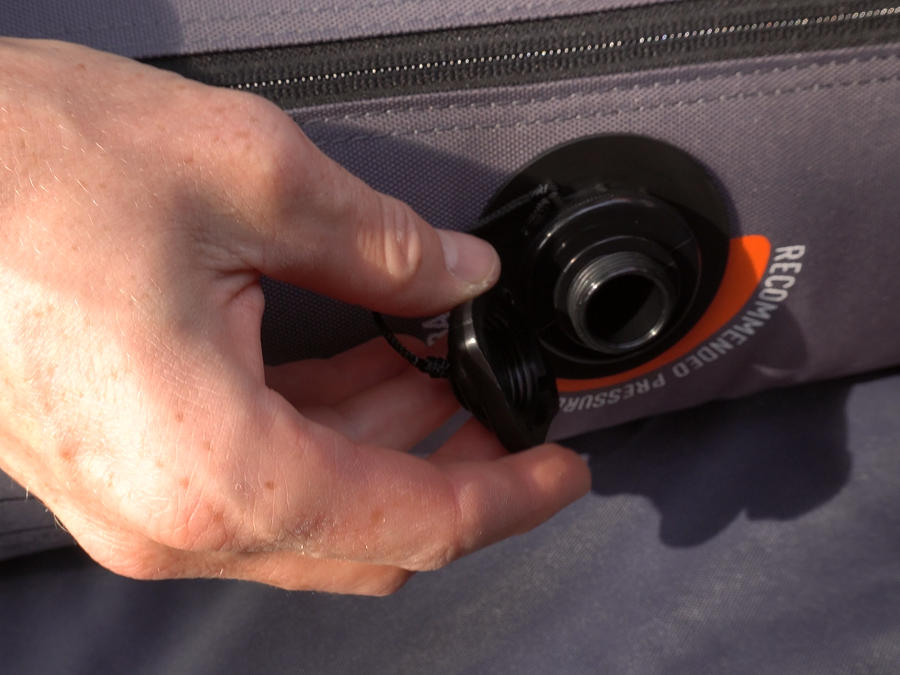
To inflate the boat, unscrew the upper cap of the valve. First you pump up the floor and then the side chambers to 0.1 bar. We used the Itiwit double stroke air pump 2 x 2.6 liters, which has an integrated air pressure gauge. In our view, this has a good price-performance ratio and its size allows the kayak to be inflated quickly as well as comfortably. If your air pump does not have an air pressure gauge, as a rough guideline you should inflate the air chamber until the wrinkles have disappeared from the polyester.
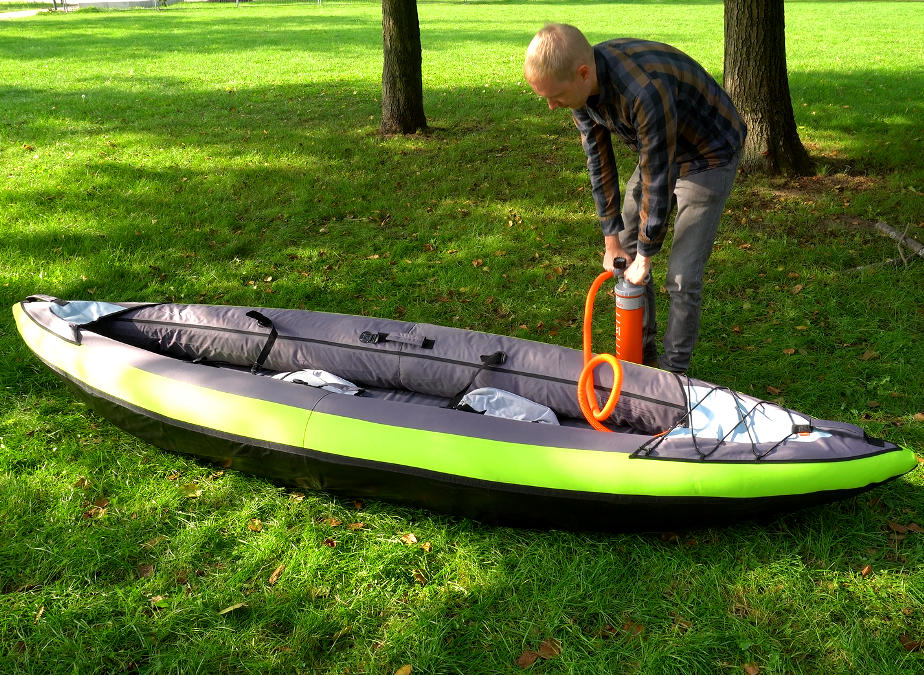
Inflation takes less than 5 minutes. You place then the seats on the bottom of the kayak, where they are attached with Velcro. The seat cushions have a mini-Boston valve and are also inflated with the air pump. So you can decide for yourself how soft or hard the seat cushion should be.
The backrest is attached to the side wall of the kayak with a strap on each side. The straps allow you to adjust the position of the backrest. The backrest itself is not inflated. This would unnecessarily give away a lot of legroom in the interior, as the boat is already quite short as a 2-person kayak. Overall, we really like the seats and their attachment from the first impression.
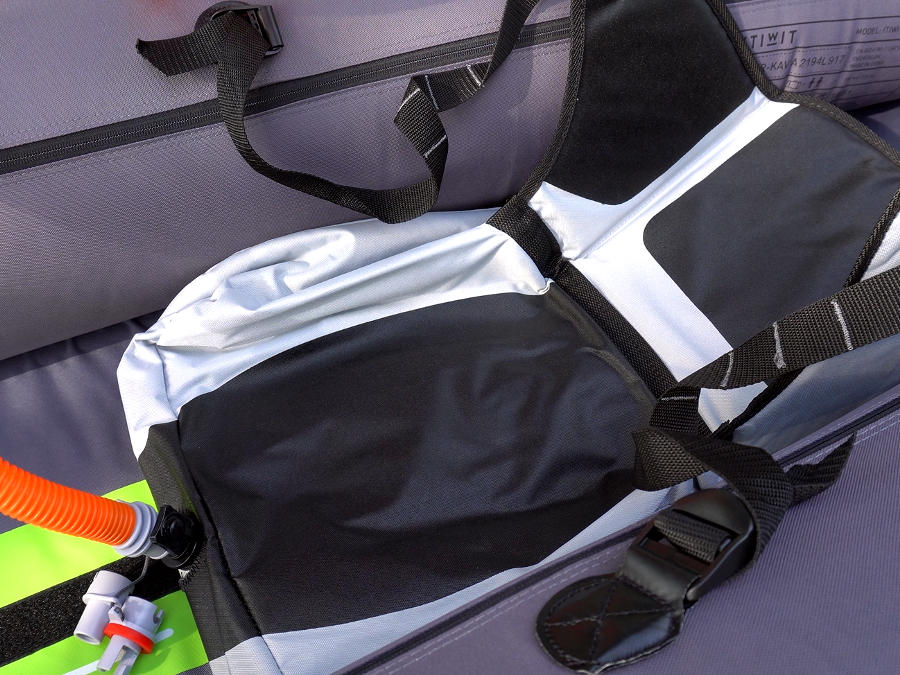
On the bottom of the kayak is marked where to place the seats in a 1 or 2-persons configuration. Nevertheless, depending on the size of the paddlers, you can vary the seats forward or backward on the long Velcro strips. The only limitation are the buckles for the backrest straps on the side walls.
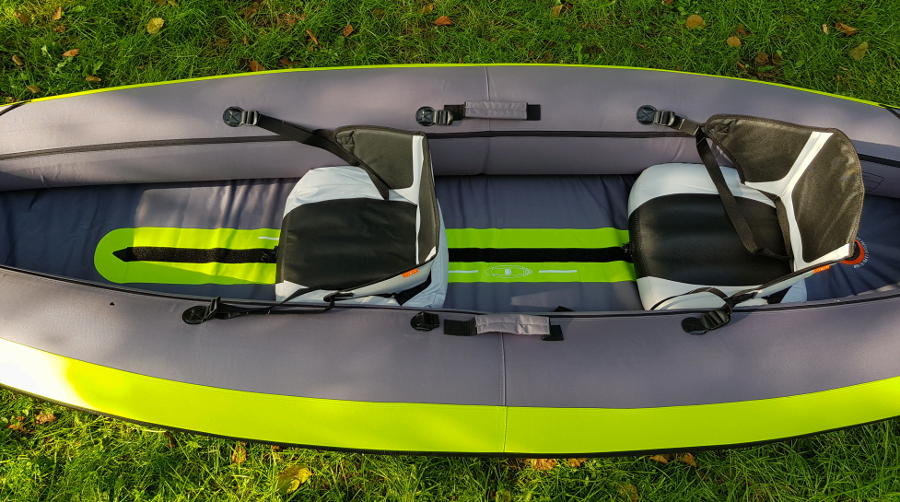
On the other hand, if you want to paddle the kayak alone, place a seat in the middle of the kayak and use the middle buckles on the side panels (near the side carry handles) to secure the backrest. The long Velcro strip inside allows for very flexible positioning and also prevents the seat cushion from slipping away while paddling.
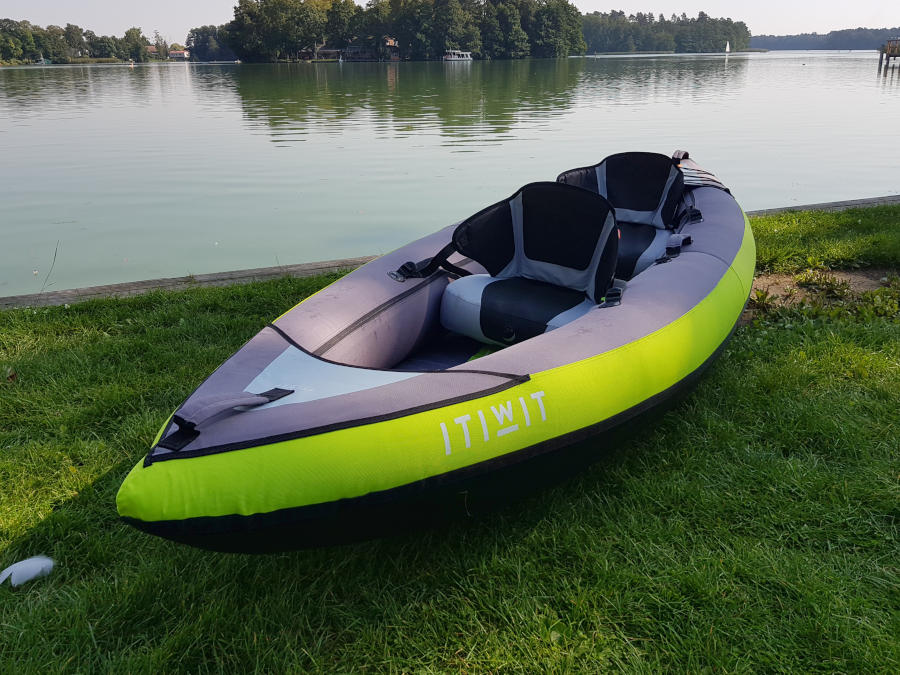
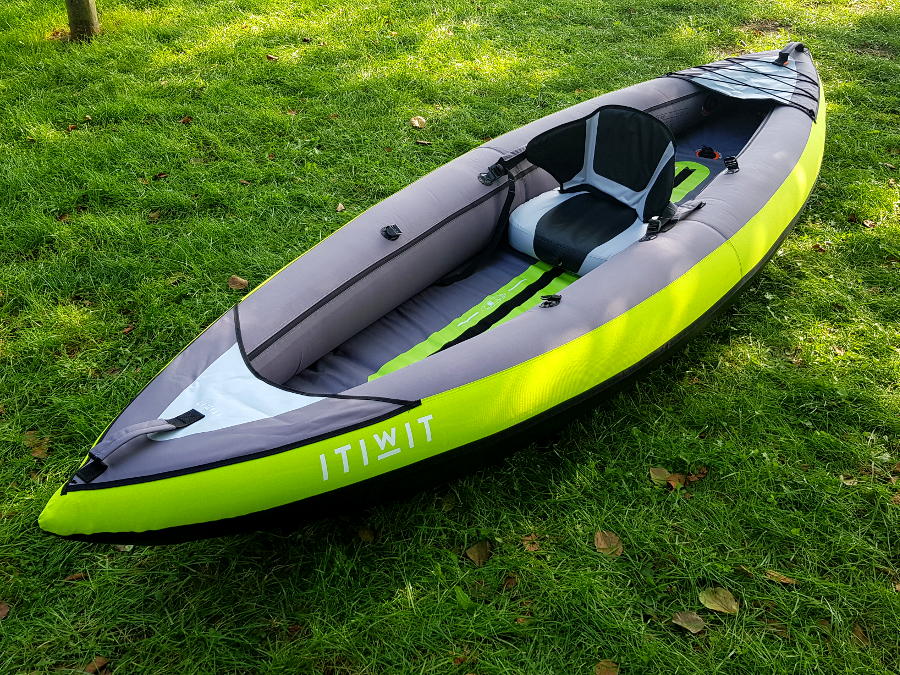
The inflatable kayak has four carrying handles. The rear and front carrying handle is for carrying the kayak with two persons. However, if you want to carry the boat to water alone, for example because you go kayaking alone, you use the two side carrying handles. This works really well because of the light weight. We miss such side carry handles on pretty much all other inflatable kayaks.
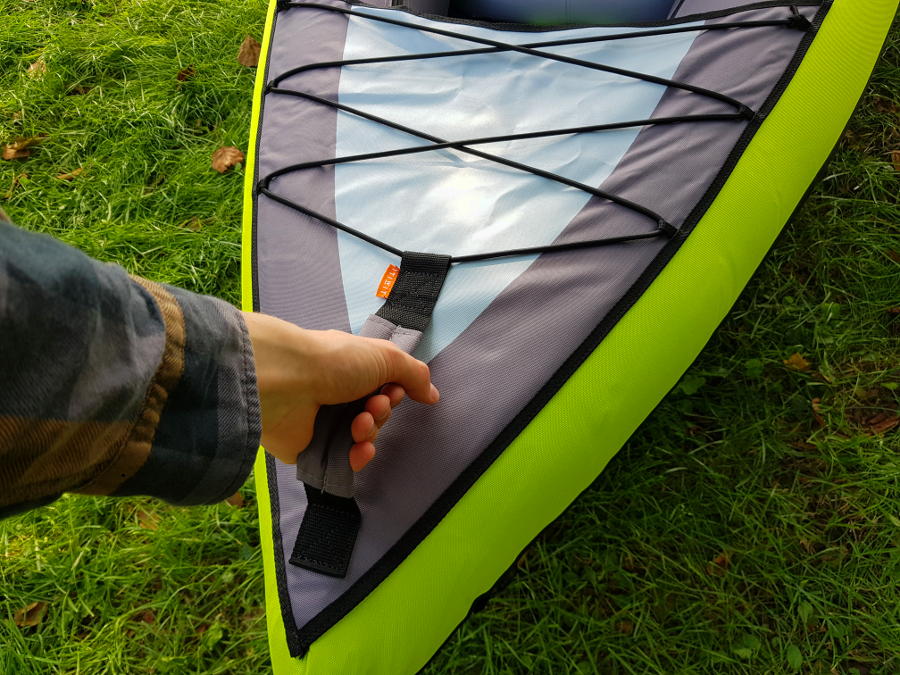
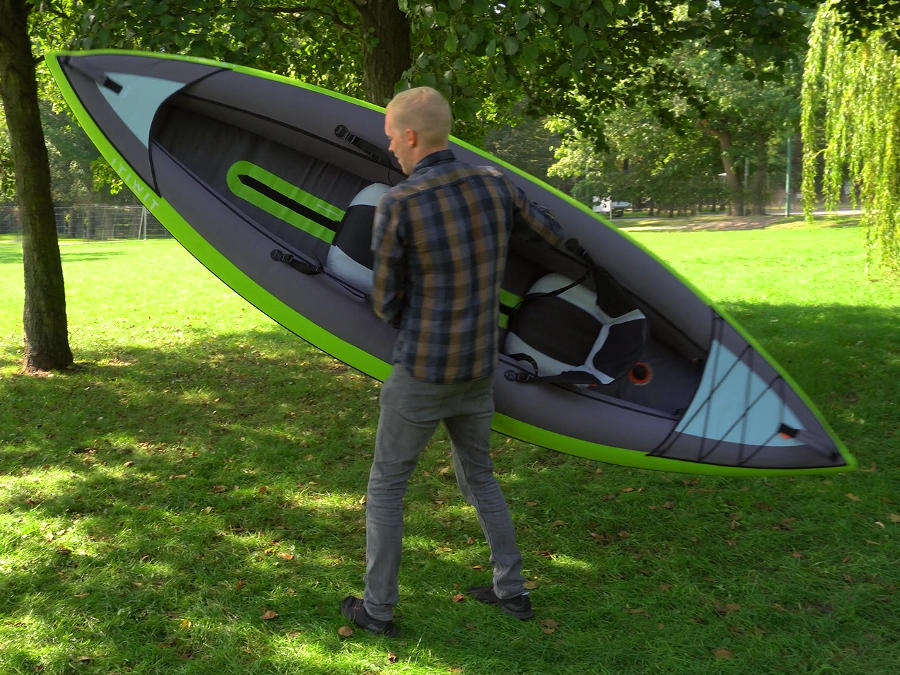
The spray covers at the bow and stern are mainly there for the carrying handles. The spraydeck at the rear is large enough, so that it comes with a luggage net. So you can not only stow the air pump or a small dry bag behind the rear seat, but also have the possibility to attach luggage.
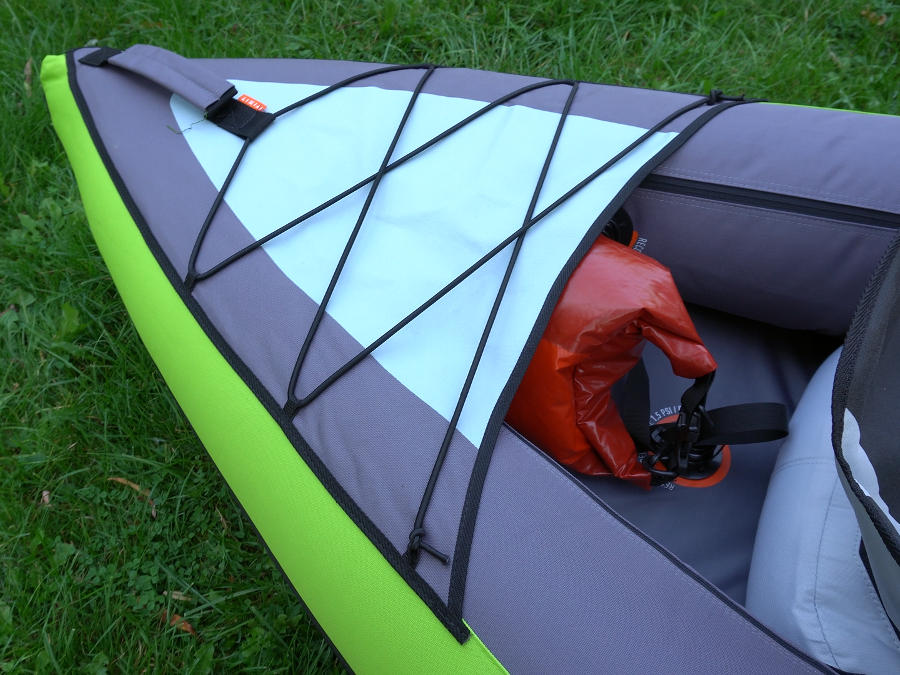
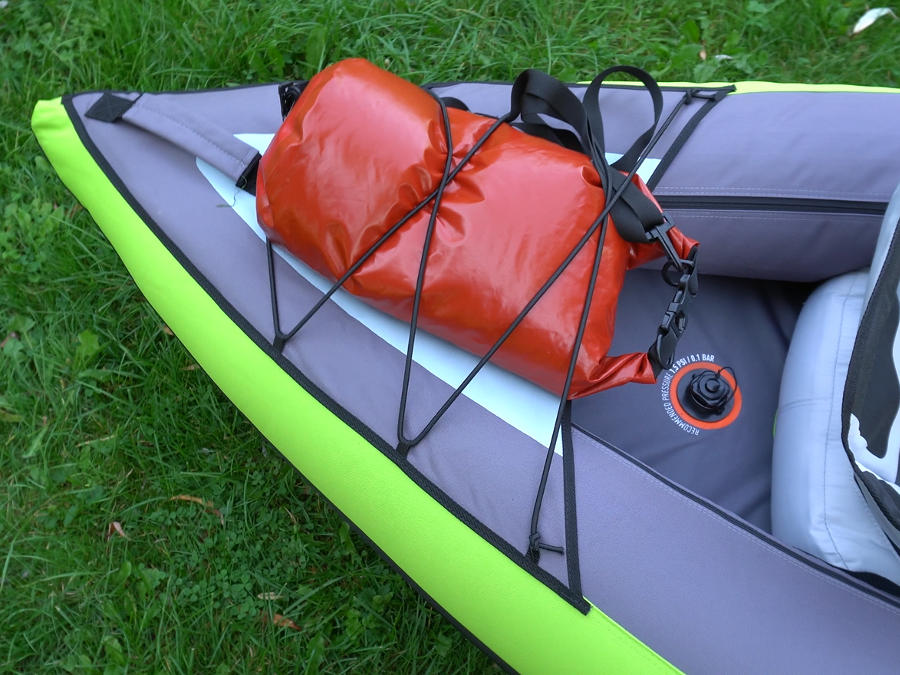
Before you take the inflatable kayak out on the water, you should attach the fins. There are three directional skegs included in the scope of delivery, which provide a better tracking stability. These are very small, so they can be used in shallow water (e.g. near the shore) and do not cause unnecessary grounding. Due to the small size, all three fins should be attached, so that an improvement in tracking stability and thus a better straight line is achieved.
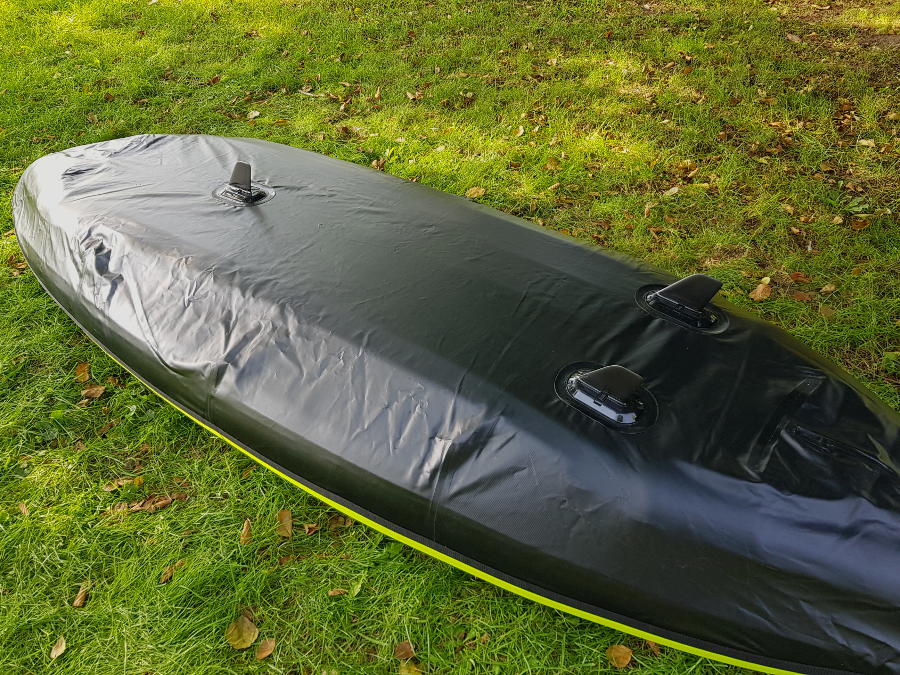
Review of the Itiwit Touring kayak on the water
The Itiwit kayak is very stable on the water due to its wide hull and voluminous side chambers. You can get into the kayak without any worries. Even jerky movements in the boat can not make it capsize so easily.
We don’t like just the stability of the kayak but also the seats right away. The seating comfort is often a big weak point in cheap inflatable kayaks. The high seat cushion of the Itiwit Touring allows a good paddling position and prevents wet buttocks if some water does get into the boat. In addition, the backrest provides good support so that you can paddle upright. Even after prolonged paddling or by leaning hard into the backrest, it did not buckle backwards. The backrest can also be easily adjusted on the water.
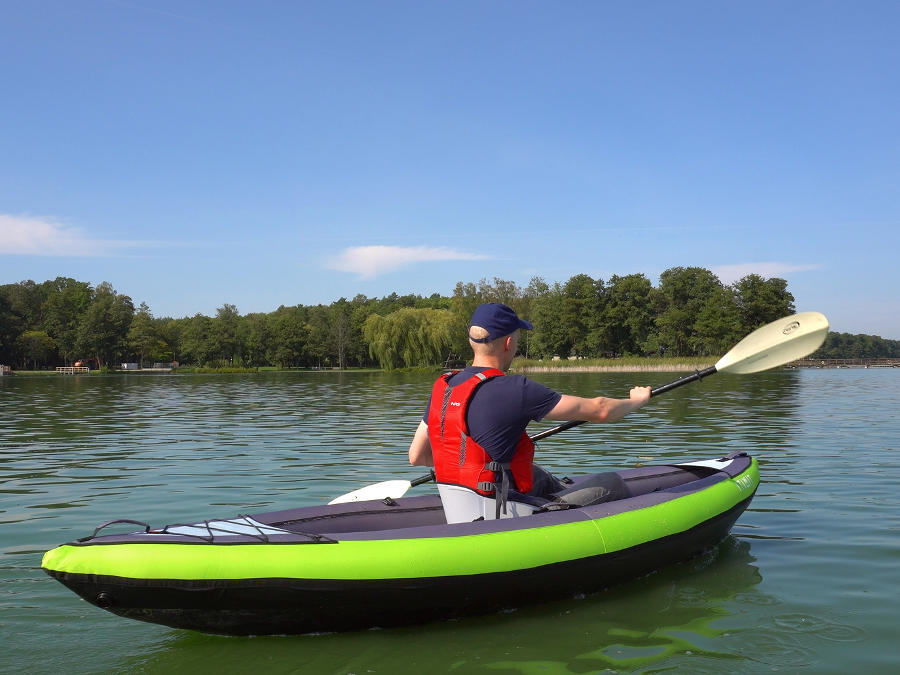
In 1-person use, the actual water length is much shorter, as the boat is only slightly in and more on the water. In this configuration, the kayak offers a lot of attack surface for winds, so it is only intended for paddling in nice weather. Still, with the three fins, reasonable paddling is possible, even if only with moderate straight-line speed.
The driving characteristics are better with two persons. Nevertheless, we would not speak of good performance on the water here either, as Decathlon describes it. When we stop paddling, the kayak immediately loses significant speed and glides only slightly through the water. After a short time, it also drifts. With two of us, we reached a speed of 4 to 4.5 km/h. However, it is well suited for small and leisurely tours of two to three hours.
The disadvantages of susceptibility to wind, low straight-line stability and low speed are natural disadvantages of an inflatable kayak. Any inflatable kayak performs worse in these categories than a rigid hull or folding kayak. Nevertheless, there are higher quality inflatable kayaks that can do much better than the Itiwit Touring. But these kayaks also cost more than twice as much.
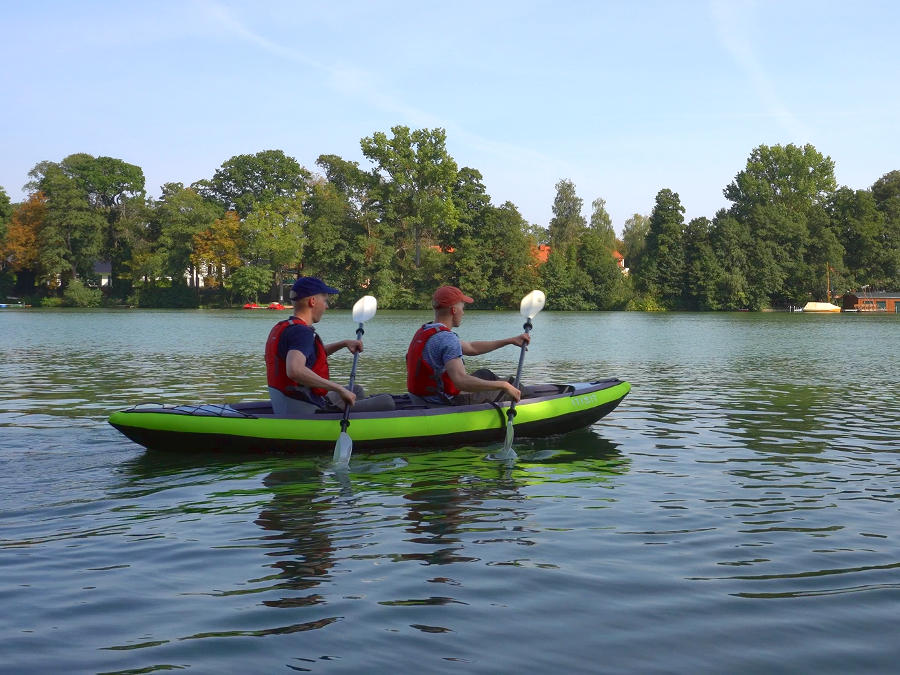
For two tall persons (over 1.80 m), the interior of the kayak is clearly too small. In the back, we could adjust the seat as we wanted, but the space for the long legs was not enough. It was much more comfortable to paddle cross-legged. The front paddler, on the other hand, has more legroom. But here, too, the wide side tubes mean that the foot space is too tight for the front paddler in the long run.
We used 230 cm double paddles and found the length to be comfortable. This length is also necessary because of the width of the boat to be able to easily poke into the water with the paddle blades. For smaller people, we would even recommend 240 cm long double paddles to avoid scraping or grazing your hand on the side tube with each paddle stroke. Alternatively, you could also paddle the Itiwit Touring with a single blade paddle, as the seats offer a sufficiently high seating position.
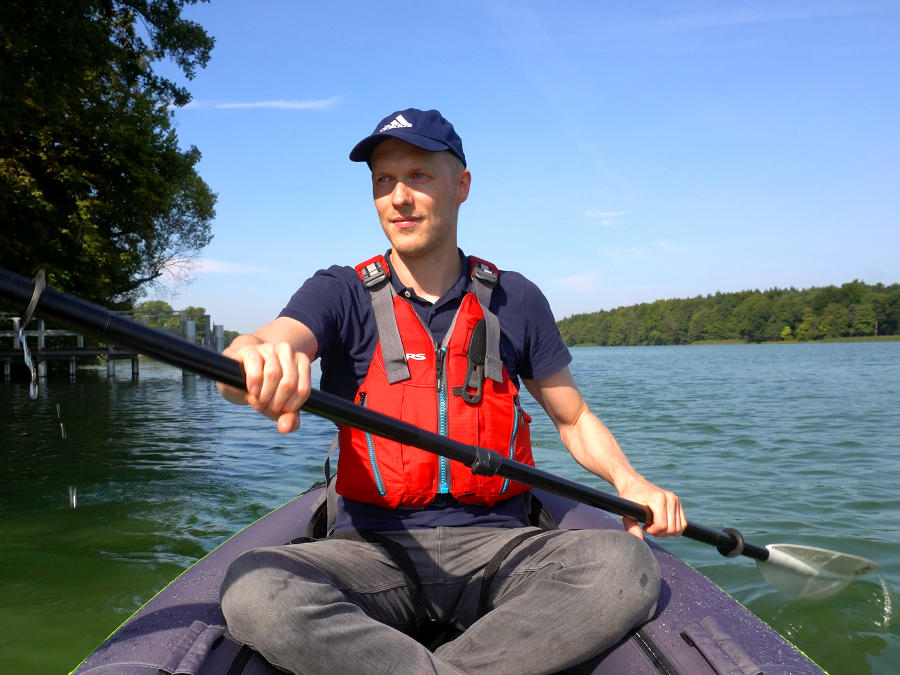
On a river tour, the moderate driving characteristics of the kayak are less noticeable. Here, the current of the river supports, so you can definitely take a half or a day trip on the river. Compared to the even cheaper Intex inflatable kayaks (e.g. Intex Challenger K2), the Itiwit Touring offers much better protection against grounding. The maneuverability is quite sufficient for rivers that are easy to paddle. It feels with its “sensational” width of 103 cm more like a “steamer” on the water.
We paddled the Itiwit Touring without fins and have to say that paddling without fins is also possible. The big difference is the drifting when you stop paddling. The kayak without fins drifts or turns away much faster than with fins.
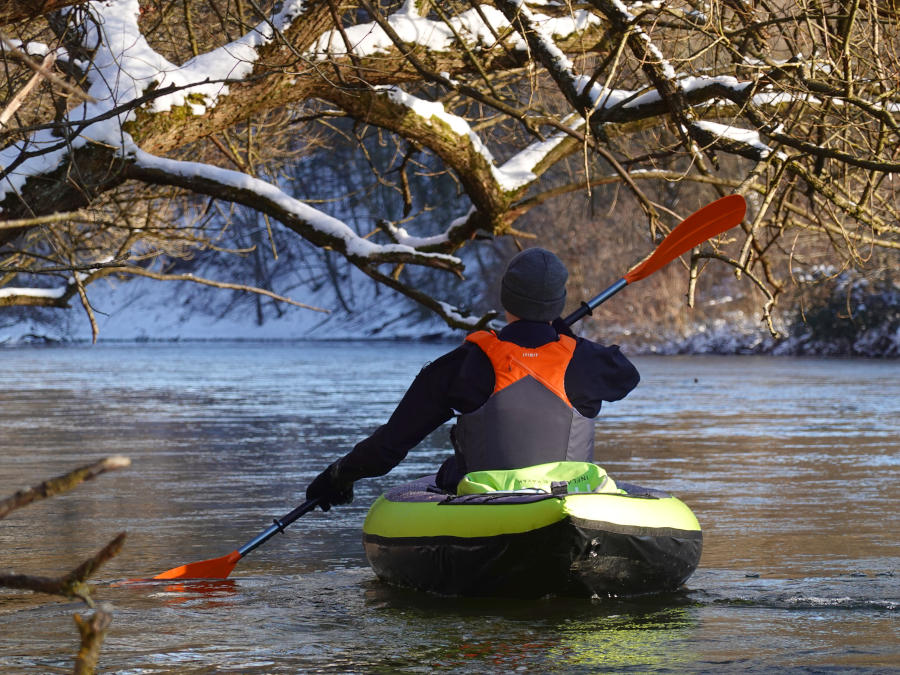
The space is very good for one person. Behind the seat you can stow the transport backpack with all your gear. The lack of footrests once again clearly shows that the Itiwit Touring is not a real touring kayak. As a 2-person kayak, the interior space is so tight that footrests are not necessary and the interior space is too small for tours lasting several hours. Here it is actually recommended to buy the Itiwit Touring 3-seater. In the 1-person configuration of the 2-seater, a footrest would have been handy to provide sufficient support in the boat. However, a footrest is not necessary for leisurely and occasional tours on the water.
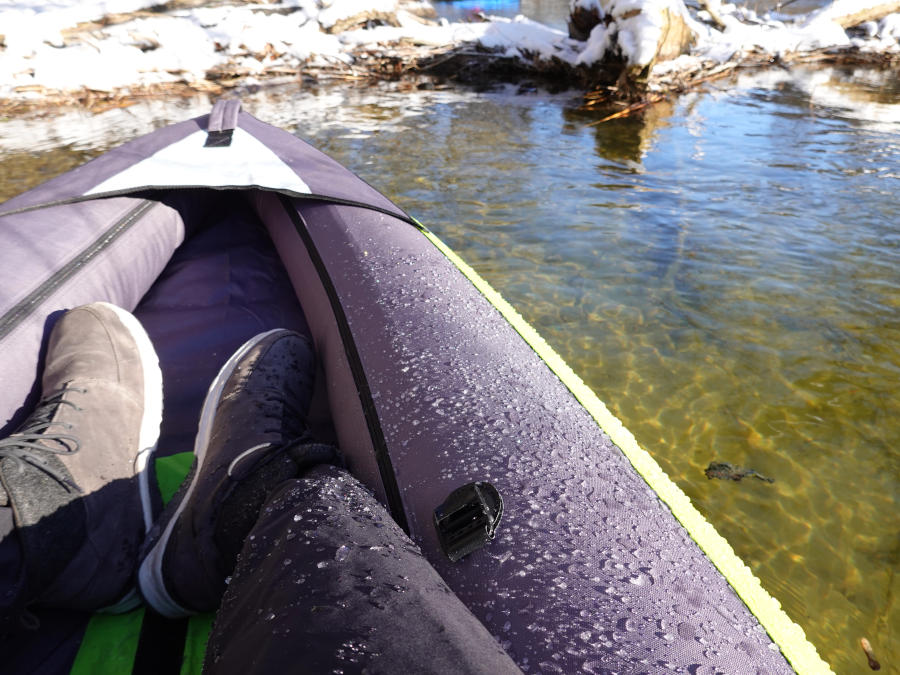
Dismantling the Itiwit Touring 2-seater
The inflatable kayak has a drain valve at the bottom of the stern. If you get a lot of water into the boat during your paddling trip (e.g. a wave from a passing motorboat) and the water is standing in the interior, this opening makes it easier for you to empty the boat.
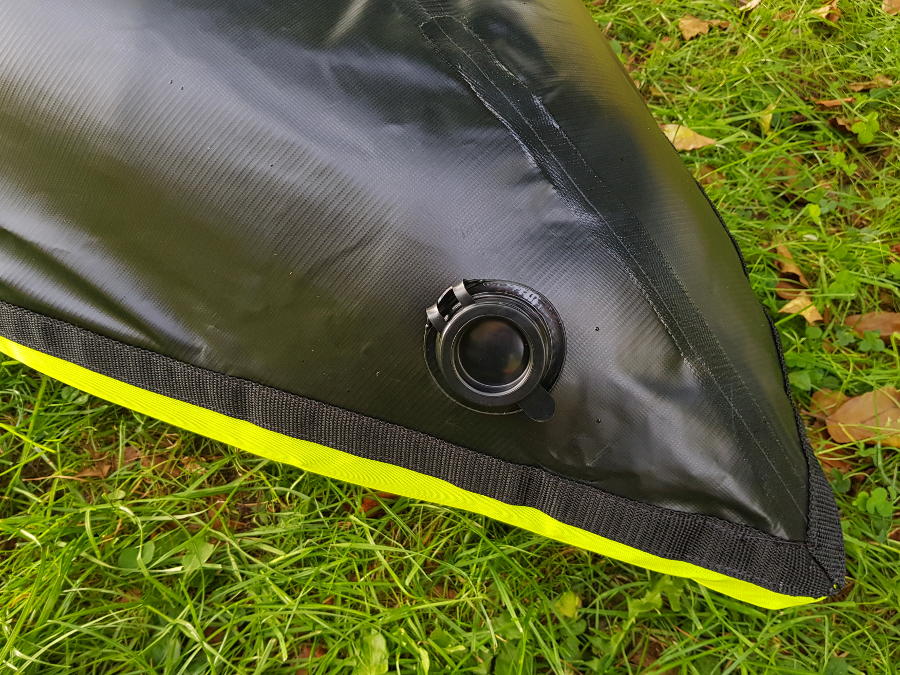
On a hot summer day, the boat dries quite quickly in the sun. However, you should let a large part of the air out of the side chambers before so that you don’t to risk overpressure from the sun. Since the cover is made of polyester, it is also relatively resistant to UV radiation. The black underside of the kayak is easy to wipe dry. If you’ve gotten a lot of water in the boat, you can even remove the inner floor chamber along with the cover so that it dries even better.
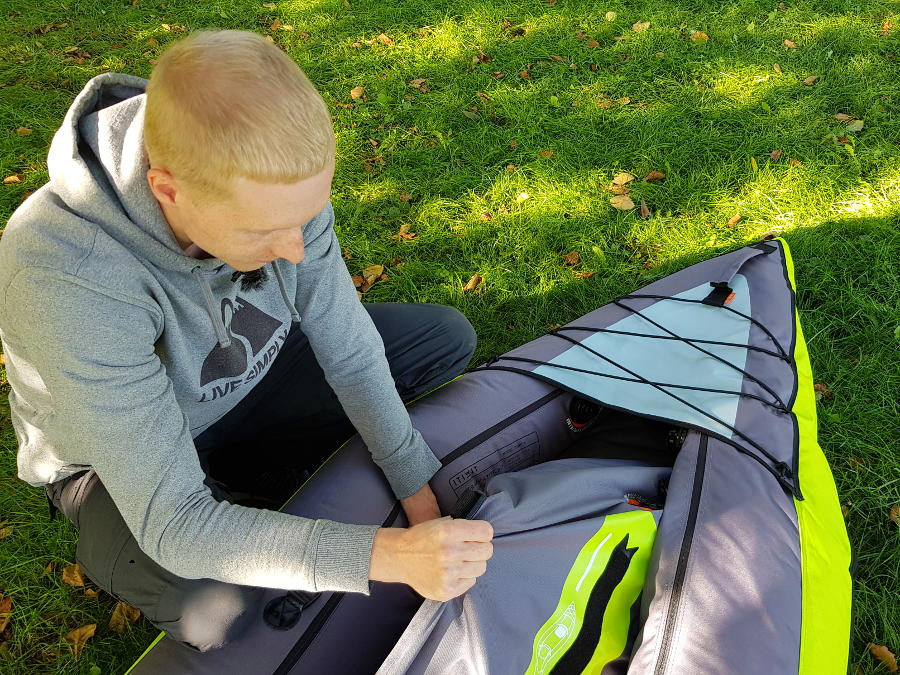
However, on long and splashy trips, the water pulls through the polyester. Here we actually recommend to let the kayak dry at home over night or longer. Also on cloudy days or who has no time after the tour for drying, must unfold the kayak again at home. Otherwise you risk that the boat soon rubs and molds. If you don’t have space at home to let the boat dry slightly inflated, we don’t recommend it. Unless you use the kayak exclusively on sunny summer days and let it dry afterwards.
Packing the kayak back into the transport backpack worked very well. The kayak is easy to fold and easy to stow again thanks to the large opening of the backpack. When folding, make sure you start folding on the opposite side of the valves. In this way, the remaining air can escape from the open valves. In addition, the skeg holders should not be bent when folding.
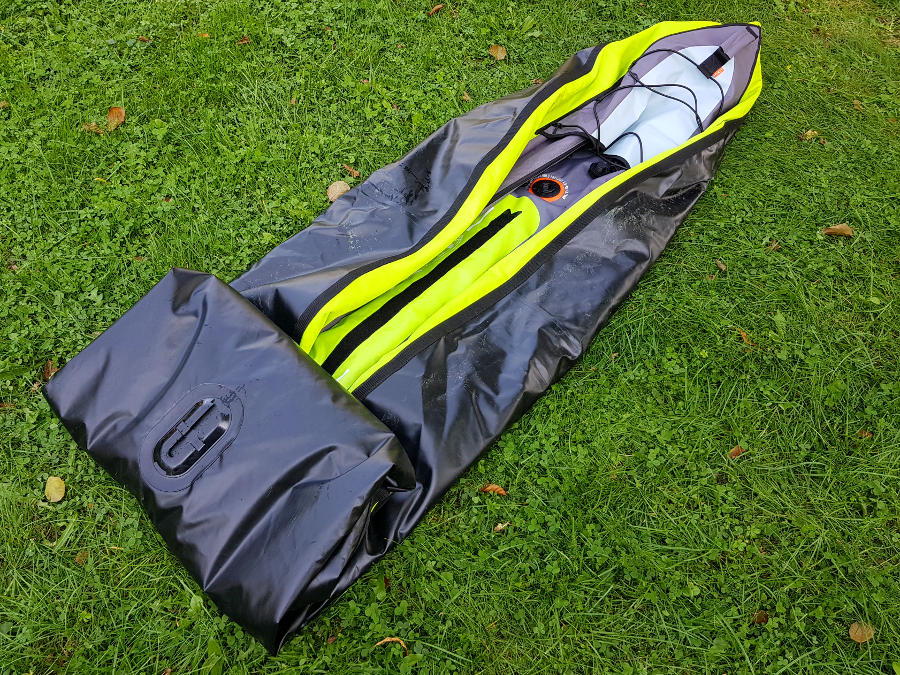
Strenghts and weaknesses of the Itiwit Touring
In our opinion, the biggest strength is the price-performance ratio. You get a well-made and stable kayak with very good seats in this price range.
Beyond occasional use, we don’t see the kayak as suitable. Due to the very wide and short hull, the kayak is quite slow for longer tours. The interior is also too small for two tall people due to the short length and bulky side chambers. In addition, the long drying time would be annoying in the long run if used frequently.
Advantages
very good price-performance ratio + stable + a total of four handles to carry the boat + for the price, the seats are comfortable and provide sufficient support when paddling + solid workmanship + good air pressure in this price range + practical luggage net at the rear + transport backpack included + spare parts are available
Disadvantages
low recommened load capacity – wide as well as flat hull and therefore slower – moderate straight running chracteristics – long drying of the polyester cover – too little space for two large people – wide side chambers can be annoying (small person with too short double blade paddle) – releasing air pressure via valve only possible with difficulty (often you then have the whole valve in your hand)
Conclusion on the Itiwit Touring kayak
For an entry-level kayak, the Itiwit Touring makes a well-thought-out and high-quality impression. Compared to similar inflatable kayaks from other brands, the Itiwit is the better one. In our opinion, the kayak offers the best price-performance ratio, has an air pressure of 0.1 bar on all air chambers and is equipped with good seats.
The outer cover seems sturdy and reliably protects the inner PVC air tubes, yet it comes with the major drawback of long drying times. The polyester cover can not simply be wiped dry, but must dry at home or after the tour in the sun.
However, we find the term touring in the product name somewhat misleading. Because a touring kayak it is definitely not. With a width of 103 cm, it is the widest kayak we know. As we know, the wider a kayak is, the slower it is. On the other hand, the Itiwit kayak is very stable against capsizing. Here you can also see the target group. The inflatable kayak is aimed primarily at beginners who want to take small and leisurely tours in the summer. For larger tours (from half-day tours), the driving characteristics are not good enough and the interior space is too small. Therefore, we agree with Decathlon’s statement that the kayak is designed for a two- to three-hour tour. So, if you are looking for a cheap inflatable kayak and occasionally want to paddle small tours on the water, you can go for this boat.
In some reviews in Decathlon’s store, customers report cracked welds, which can be caused by overpressure or production defects. Even if Decathlon replaces the chamber during the warranty period, the boat is not ready for use for a certain time or the tour cannot be started.
Alternatives to the Itiwit Touring 2
There are also other kayaks from Itiwit, which could be the better choice for you if you find want more space or if you don’t like the long drying time. In case you want to go paddling with another tall person and you want more space, then we recommend the Itiwit Touring 3 Seater, which can also be paddled by two persons. You just have to remove the third seat. In case you want a kayak that is easy to dry, you should have a look at the x100+ series, which is available as a 2 and 3 persons kayak.
Another brand that offers similar kayaks is Sevylor. The Sevylor Adventure Plus for example has also a nylon cover that protects the air chambers from damage and space for up to three persons.
Hi!
Thanks for the review, a quick question if you can help me.
What would you choose between
1. BESTWAY HYDRO FORCE
VENTURA
2. INTEX EXCURSION
PRO
3. ITIWIT TOURING 2
Thanks!
Hello Catalin,
I would go either for the Intex Excursion Pro or the Itiwit Touring 2 depending on your needs and requirements. The Intex Excursion Pro is easier and quicker to dry and I would say that it has better paddling performance on the water (but only if you get better paddles than the included ones) since its longer and thinner than the Itiwit kayak. If drying is not an issue for you and you want to do more relaxing paddling tours then I would go for the Itiwit kayak. The seats are really comfortable and you get spare parts if something breaks one day. The workmanship of Itiwit kayaks are also pretty solid for what you pay.
Best
Christian
Would you consider this boat as suitable for the sea close to the coast?
Hi Daniel,
yes, if the conditions are good (no waves, no wind, warm enough) then you can use it on the sea close to the coast. Always use life jackets and get familiar with your new boat before.
Best
Christian
Hi, I will be using a kayak at times on my own and at other times with another person. I am trying to decide between the itiwit 2 and the Sevylor Colorado. So far I favour the itiwit 2 but comments on poor tracking with one person in the kayak are a slight concern. Which of these would be better for single person use.
Hi Daniel,
I think the tracking with one person in the kayak is not better with the Sevylor Colorado. I would prefer the Itiwit kayak since it offers more value for the price. It has small spray decks on the bow and stern and better seats as well as you have better possibilities to repair it in case of damage.
Best regards
Christian
Hi,
Thank you for your review. It helps since I am about to buy inflatable kayak.
But, I am thinking would it be better to take 2/3 itiwit seater instead of this one? I am quite heavy and tall but most of the time I would use it alone.
Would 2/3 seater dimensions affect usability a lot if paddled by one person?
Thank you in advance.
Sincerely,
Ognjen
Hello Ognjen,
it depends if you want to have more space or better paddling characteristics. If you want to have more space than the 2/3 seater is the better choice for you. But in terms of paddling characteristics the 2 seater could be the smarter choice it’s shorter. If you have too much weight in a longer kayak like the 2/3 seater in the center of the kayak the stern and bow are not touching the water anymore since the weight is all in the center. This has an impact on the performance on the water and it will be less fun to paddle unless you put some weight at the bow and stern to outbalance it.
Best regards
Christian
The recommended load capacity does seem low at 331 lbs. Do you know if that weight has been tested / a reasonable amount that can go over the limit?
Hello Eric,
we haven’t tested that and can’t tell you how much you can go over that limit. Some kg extra shouldn’t be a big issue. We assume that it would impact at first the paddling performance on the water.
Christian
Hi- I am looking for a 2-man kayak and a 1-man kayak.
Do you still believe the itiwit 2 is the best for quality and cost? Or is there better in your opinion.
Also the 1-man would be for my 14yr old son. He is a complete beginner- do you have any recommendations?
Hello Stacey,
the value for money of the Itiwit Touring is definitely still very good. But it also depends on your needs if if it’s the best kayak for quality and cost. Under which conditions will you use it, how often, what are your expectations regarding speed and performance on the water? The best kayak is the one that meets your requirements the best and which is still within your budget.
Best regards
Christian
Hi ,
Do you know how durable is the kayak. For instance hitting a corals by accident or o rocks? In other words how safety is it ?
Hi Rikaz,
I personally don’t worry too much when hitting a rock but it really depends on the rock as well. If you hit a sharp part of it pretty much, it can damage the kayak. But for the Itiwit Touring spare parts are available and you can also repair little holes. The Itiwit Touring is additionally protected by its nylon cover on the sides, which protects it from damages. Regarding safety you have three air chambers. So, even when damaging one chamber the other two chambers will still make it possible for you to get back to the shore.
Best regards
Christian
Hi Christian,
I’m looking to get the 3 seater 100+with drop stich. Two points I still haven’t got an answer to and was hoping you could give some info. I would use this in lakes in Canada and calm rivers.
1- Would the 3 seater be any use as a single person? Can it be used a single rider?
2- Is drop stich worth getting?
Thanks in advance,
Ben
Hello Ben,
1 – The 3 seater can be used as a 1 person kayak. You just take the other two seats out. However, the paddling characteristics are not that good if you paddle it alone because all the weight is in the center and the bow and stern don’t really have contact to the water anymore (unless you put some extra weight in the bow and stern). You can paddle it like that but other 1 or 2 persons kayak perform better. You should buy the 3 seater if you mainly want to use it as a 2 or 3 persons kayak and only from time to time as a 1 person kayak.
2- Not in terms of paddling characteristics and performance on the water. Here, the differences are not really significant. It’s worth getting the drop-stitch version if quick drying after usage and a very stable and stiff floor are important to you.
Best regards
Christian
Hi Christian,
Thanks for the very useful review!
You’ve commented on paddle length, but I am still a bit uncertain what length of paddles to order – wouldn’t 240cm long paddles be a bit difficult to handle for a shorter person? Have read some Decathlon instruction to add 25 cm to your height for correct paddle length, and even subtract 5cm for beginners? But maybe this kayak is too wide for this formula to be of meaningful guidance?
What length of paddles would you recommend for the itiwit touring 2 boat for one adult 1.75 cm and one teen 1.50cm, both beginners. Is it OK for the sailing if the two people in the kayak use different length paddles?
Thanks in advance for your recommendation!
Hello Davina,
for a child I would take 210-220 cm and for a 1,75 m person I would take 230-240. That’s only my recommendation but at the end you have to try out which paddle length is better for you because everybody has also different body proportions and not the same paddling technique.
Best regards
Christian